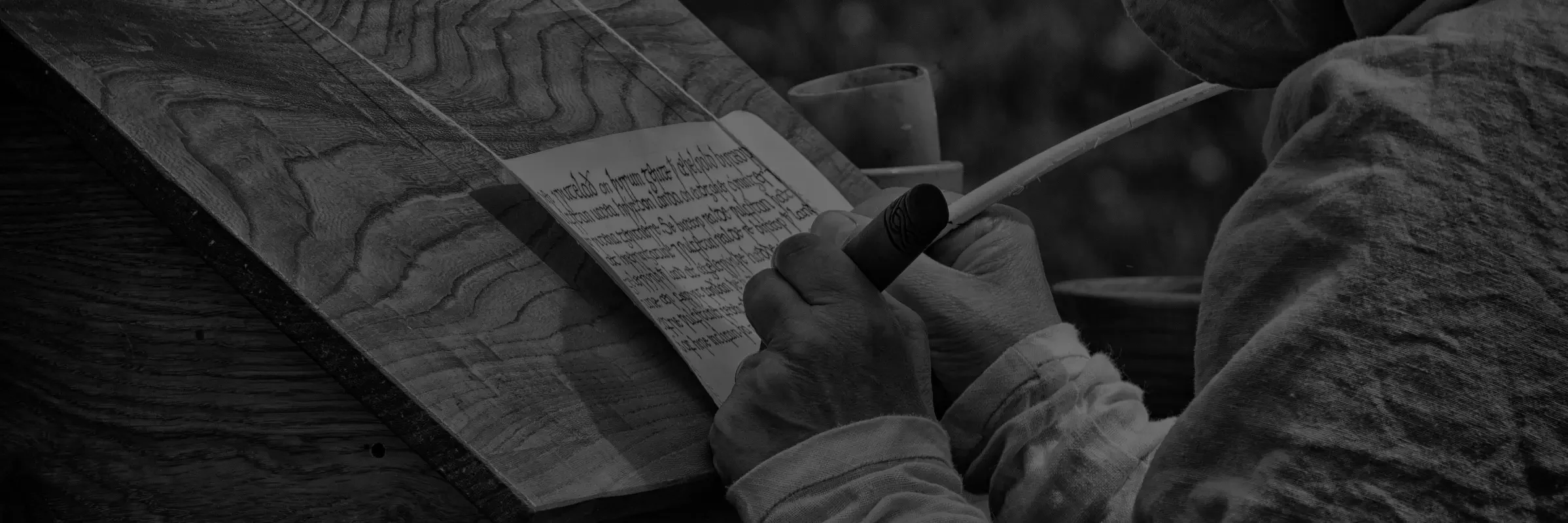Wirral's Hidden History Revealed
The Viking Raid on Lindisfarne
The monastery at Lindisfarne was the pre-eminent religious centre in Northumbria and was acknowledged as such throughout the Kingdom’s of Anglo-Saxon England.
The Five Boroughs of the Danelaw
After years of fighting, Alfred the Great was able to bring the Vikings or Danes to the negotiating table, following his decisive victory at the battle of Edington in 878 AD.
Welsh & The Anglo Saxons
The relationships between the Welsh and the Anglo-Saxons were a complex and often confusing subject. Following the withdrawal of the Roman military in about 410 AD, Southern Britain still maintained Roman Civic and Military organisation whilst various small Kingdoms formed in the North and the West. The Saxons and Angles as well as Jutes and other Germanic groups had been settled in…
Sweyn Forkbeard
Following Athelstan’s victory at Brunanburh in 937 AD, a path lay open to a united England which would see a dynasty of Anglo-Saxon kings rule a country which had, after centuries of warfare with the Vikings finally defeated the northern menace.
Hengist and Horsa
Hengist and horsa, founders of the english people or mythical Legend? Legend states that the Germanic brothers Hengist and Horsa were the leaders of warbands of Saxons, Jutes and Angles who invaded post Roman Britain in the 5th century. Sources state that they had landed at Ebbsfleet (Eopwinesfleot) on the Isle of Thanet and that they had been employed by the British…
Post Conquest Fyrd
It is often assumed that after the Norman conquest, that many Anglo-Saxon institutions became redundant or were replaced by others, of Norman origin.
Paris Siege – 885-886 AD
In the recent TV series Vikings, Ragnar Lothbrok’s attack on Paris was a visual masterpiece in portraying a dramatic and brutal fight which was certainly entertaining, but what really happened? Was the film a true representation of what had occurred?
Offa
Offa became King of Mercia in 757 AD. The son of Thingfrith, he claimed descent from Eowa, the brother of Penda, the great pagan King of Mercia who defeated the Christian Northumbrian King, Oswald at the battle of Maserfield in 641 or 642 AD
Eric Bloodaxe
Hail to you Eric, be welcome here and come into the hall, gallant King. The Eiriksmal So reads the epitaph, the Eiriksmal, written by an unknown Norse poet in the service of Eric’s widowed wife.
Constantinople 860AD
On the 18th of October 860 AD, the city guards of the great city of Constantinople were alerted to a fleet of over 200 longships appearing on the horizon. They had entered the Bosporus from the Black Sea. The city’s warning bells rang out and the guards stationed at the many gates of the city prepared to close and bar the entry…
THE BATTLE OF NORTHAM JUNE 1069
The battle of Northam took place between the north Devon villages of Appledore and Northam in 1069. Two sons of Harold Godwinson, the English King killed at Hastings on the 14th of October 1066, namely Godwin and Edmund, returned to England with the intent of initiating an Anglo-Saxon rebellion to overthrow the Norman King, William.
The Harrying of the North.
After Duke William’s victory at the battle of Hastings on the 14th of October 1066 there is a general acceptance that England was completely subjugated by the Normans and that the English population was totally pacified. This was not the case and the Normans would pay a high price in both blood and treasure to finally establish dominance.
Arthur – Once And Future King
Of all the myths and legends of Britain the most enigmatic and intriguing hero is Arthur. Forget the late romantic versions of the later medieval period, the knights of the round table, Camelot, Gwynevere, Lancalot, the Green Knight and a hundred and one other mystical and mythical characters and instead, look for a late Romano warlord who, for a generation, halted the Saxon advance into the west of Britain.
Ingimunds Attack On Chester 907AD
In 907 AD, Ingimund, a Hiberno-Norse chieftain, who had been allowed to settle on the north Wirral coast by Aethelflaed, sometime in 902, led an attack on the city of Chester.
Battle of Fulford Gate
Of the 3 major battles of the momentous year of 1066, the battle which took place at Fulford is the least known, yet it was a fierce engagement and one that must have weakened the Viking army led by their infamous leader, King Harald Hardrada of Norway.

